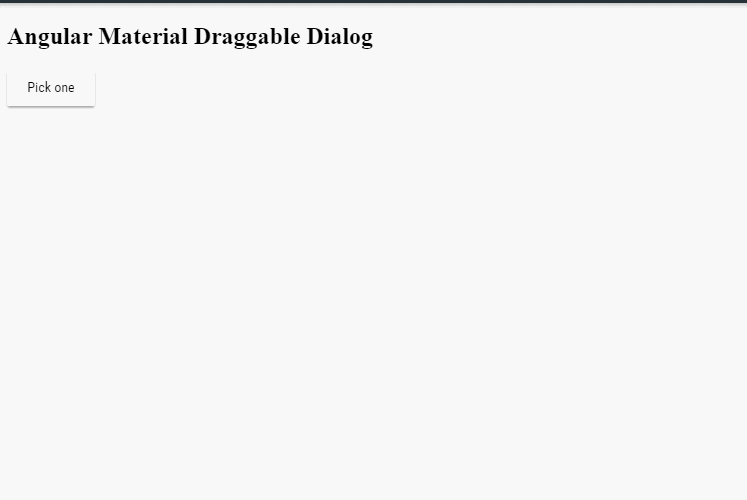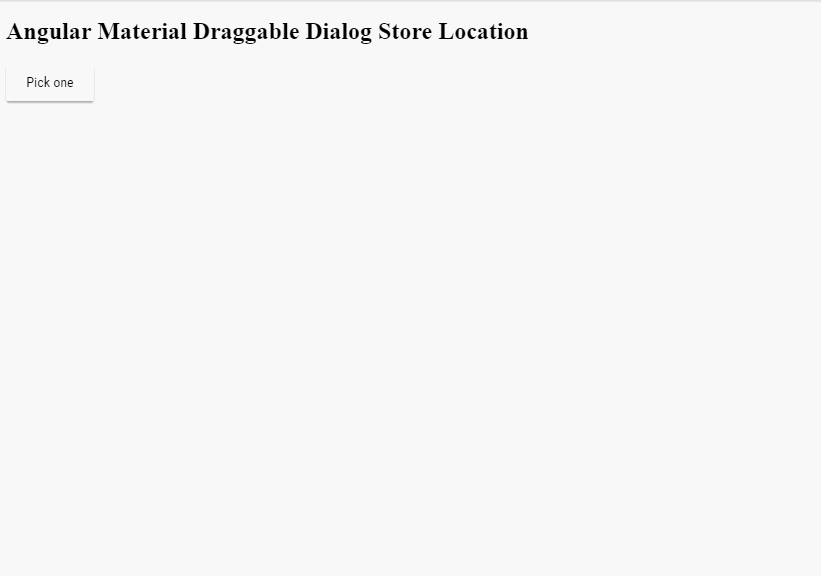Update since Angular Material 7
You can simply use cdkDrag directive from @angular/cdk/drag-drop
dialog.html
<h1 mat-dialog-title
cdkDrag
cdkDragRootElement=".cdk-overlay-pane"
cdkDragHandle>
Hi {{data.name}}
</h1>
Previous answer:
Since there is no official solution for that, I’m going to write custom directive that will be applied on a dialog title and do all job for us:
dialog.html
@Component({
selector: 'app-simple-dialog',
template: `
<h1 mat-dialog-title mat-dialog-draggable-title>Hi {{data.name}}</h1>
^^^^^^^^^^^^^^^^^^^^^^^^^^^
<div mat-dialog-content>
...
</div>
<div mat-dialog-actions>
...
</div>
`
})
export class SimpleDialogComponent {
The basic idea here is to use MatDialogRef.updatePosition method for updating dialog position. Under the hood this method changes margin-top|margin-left values and someone can argue that it’s not the best option here and it would be better if we used transform but I simply want to show an example of how we can do it without some tricks and with the help of the built-in services.
We also need to inject MatDialogContainer in our directive so that we can get initial position of dialog container. We have to calculate initial offset because Angular material library uses flex to center dialog and it doesn’t get us specific top/left values.
dialog-draggable-title.directive.ts
import { Directive, HostListener, OnInit } from '@angular/core';
import { MatDialogContainer, MatDialogRef } from '@angular/material';
import { Subscription } from 'rxjs/Subscription';
import { Observable } from 'rxjs/Observable';
import { takeUntil } from 'rxjs/operators/takeUntil';
import 'rxjs/add/observable/fromEvent';
import { take } from 'rxjs/operators/take';
@Directive({
selector: '[mat-dialog-draggable-title]'
})
export class DialogDraggableTitleDirective implements OnInit {
private _subscription: Subscription;
mouseStart: Position;
mouseDelta: Position;
offset: Position;
constructor(
private matDialogRef: MatDialogRef<any>,
private container: MatDialogContainer) {}
ngOnInit() {
this.offset = this._getOffset();
}
@HostListener('mousedown', ['$event'])
onMouseDown(event: MouseEvent) {
this.mouseStart = {x: event.pageX, y: event.pageY};
const mouseup$ = Observable.fromEvent(document, 'mouseup');
this._subscription = mouseup$.subscribe(() => this.onMouseup());
const mousemove$ = Observable.fromEvent(document, 'mousemove')
.pipe(takeUntil(mouseup$))
.subscribe((e: MouseEvent) => this.onMouseMove(e));
this._subscription.add(mousemove$);
}
onMouseMove(event: MouseEvent) {
this.mouseDelta = {x: (event.pageX - this.mouseStart.x), y: (event.pageY - this.mouseStart.y)};
this._updatePosition(this.offset.y + this.mouseDelta.y, this.offset.x + this.mouseDelta.x);
}
onMouseup() {
if (this._subscription) {
this._subscription.unsubscribe();
this._subscription = undefined;
}
if (this.mouseDelta) {
this.offset.x += this.mouseDelta.x;
this.offset.y += this.mouseDelta.y;
}
}
private _updatePosition(top: number, left: number) {
this.matDialogRef.updatePosition({
top: top + 'px',
left: left + 'px'
});
}
private _getOffset(): Position {
const box = this.container['_elementRef'].nativeElement.getBoundingClientRect();
return {
x: box.left + pageXOffset,
y: box.top + pageYOffset
};
}
}
export interface Position {
x: number;
y: number;
}
Remember location
Since @Rolando asked:
I want to ‘remember’ where the modal was positioned so that when the
button to open the modal is hit, the modal opens up where ‘it was last
located’.
let’s try to support it.
In order to do that you can create some service where you will store dialog positions:
modal-position.cache.ts
@Injectable()
export class ModalPositionCache {
private _cache = new Map<Type<any>, Position>();
set(dialog: Type<any>, position: Position) {
this._cache.set(dialog, position);
}
get(dialog: Type<any>): Position|null {
return this._cache.get(dialog);
}
}
now you need to inject this service in our directive:
dialog-draggable-title.directive.ts
export class DialogDraggableTitleDirective implements OnInit {
...
constructor(
private matDialogRef: MatDialogRef<any>,
private container: MatDialogContainer,
private positionCache: ModalPositionCache
) {}
ngOnInit() {
const dialogType = this.matDialogRef.componentInstance.constructor;
const cachedValue = this.positionCache.get(dialogType);
this.offset = cachedValue || this._getOffset();
this._updatePosition(this.offset.y, this.offset.x);
this.matDialogRef.beforeClose().pipe(take(1))
.subscribe(() => this.positionCache.set(dialogType, this.offset));
}
As you can as soon as dialog is going to be closed i save last offset.
This way dialog remembers where it was closed

